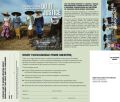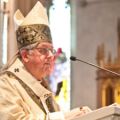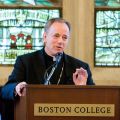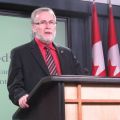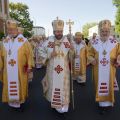Canadian bishops’ plenary Sept. 24-28 marks historic events
By Deborah Gyapong, Canadian Catholic NewsOTTAWA - The Canadian Conference of Catholic Bishops’ (CCCB) annual plenary Sept. 24-28 in Ste. Adele, Que., will mark many firsts this year, from distinguished guests to reflections on topics as diverse as the Second Vatican Council and the worldwide economic crisis.
The gathering, which is expected to draw 80 bishops from across Canada, comes on the eve of several historic events that will also be addressed: the 50th anniversary of the opening of the Second Vatican Council Oct. 11, the Synod of Bishops on New Evangelization Oct. 7-28 in Rome and the canonization of Kateri Tekakwitha on Oct. 21.
“(The plenary) is always such an important moment in the life of the Canadian Church,” said CCCB general secretary Msgr. Patrick Powers. The CCCB executive and secretariat staff “always look forward to the many, many things that will be decided upon in the course of that meeting.”
Among the highlights of this year’s agenda is the visit of Ukrainian Major Archbishop Sviatoslav Shevchuk who will offer a reflection Sept. 25 after having presided at the worldwide Ukrainian Catholic Church Synod of Bishops in Winnipeg Sept. 9-16. He has made pastoral visits to various cities in Canada over recent months to mark the 100th anniversary of the arrival of the first Ukrainian Catholic Bishop Nyktyta Budka to Canada.
Msgr. Jeffrey Steenson, the new Ordinary for the United States’ Personal Ordinariate of the Chair of St. Peter, will also attend. The Ordinariate was erected in January to provide a home for people from the Anglican tradition who wish to become Catholic while maintaining aspects of Anglican liturgy and patrimony under the Holy Father’s 2008 Apostolic Constitution Anglicanorum coetibus. Toronto Cardinal Thomas Collins, the episcopal delegate for Anglicanorum coetibus in Canada will give a report on progress, Powers said.
Immigration Minister Jason Kenney will also hold an off-the-record discussion with the bishops. Powers said it will be a “give and take” session on a range of concerns, from recent legislation that impacts refugees, to the parish refugee sponsorship programs. Many dioceses have a significant number of foreign priests, Powers said, “so (Kenney) is well-placed to help the bishops understand the various things that are happening.”
The canonization of Kateri Tekakwitha gets prominent billing. Saint-Jean-Longueil Bishop Lionel Gendron, the CCCB co-treasurer who heads a temporary secretariat to co-ordinate events in Canada and in Rome surrounding the canonization, will make a presentation on this significant event to the Church and to native Catholics.
To mark the 50th anniversary of the Second Vatican Council, Laval University theologian Gilles Routhier, who is an expert on the Canadian contribution to Vatican II, will deliver a talk.
The Canadian bishops elected last year as delegates at the Synod on New Evangelization will inform the plenary of the content of their Synod interventions, Powers said.
The bishops will also hold a discussion on the upcoming Year of Faith instituted by Pope Benedict XVI.
The bishops will also hold a dinner for Montreal Cardinal Jean-Claude Turcotte who retired this year as archbishop of Montreal, and Collins, who received his cardinal's red hat last February.
The bishops also have a packed agenda of presentations and reports that happen every year, such as reports from organizations like the Canadian Catholic Organization for Development and Peace, the Canadian Aboriginal Council, the Catholic Organization for Life and Family and other groups. The episcopal commissions will report as will standing committees, such as communications and Development and Peace. The bishops will address fiscal matters and adopt a new budget.
Development and Peace fall campaign is put on hold
By Michael Swan, The Catholic RegisterThe traditional fall education campaign of the Canadian Catholic Organization for Development and Peace is on hold until Oct. 15 while staff and volunteers scramble to come up with less political material that will gain the backing of all of Canada's bishops.
Canadian Conference of Catholic Bishops president Archbishop Richard Smith and general secretary Msgr. Pat Powers informed Development and Peace Sept. 5 that several bishops had objected to the fall campaign and did not want the material distributed in their diocese. It is the first time in the 45-year history of the Catholic development agency that the bishops have intervened to block an education campaign.
Neither the CCCB nor Development and Peace could tell The Catholic Register how many bishops have objected to campaign materials, which have been printed but not yet distributed. Through a spokesperson, Smith declined to be interviewed for this story as "the bishops have not had a chance to discuss the issue."
Bishops on the CCCB's Standing Committee on Development and Peace were not consulted on the move to halt the campaign and have not seen the materials.
"I haven't had it explained to me, so I can't really comment," said Toronto's Bishop John Boissonneau, chair of the committee. "I was aware that the president of the conference sent out a letter, but there's been no follow-up with me directly."
"I kind of feel out in the cold on this," said committee member Bishop Richard Grecco of Charlottetown.
The last time the bishops' committee met was May 31 for a consultation with the Development and Peace liaison committee for relations with the bishops. Meanwhile, work on the fall education campaign had been delayed until June while the organization dealt with major restructuring to accommodate a drastic cut in Canadian International Development Agency funding.
The fall campaign was to have veered off-course from Development and Peace's five-year plan of environmentally themed education campaigns. This campaign, which included postcards addressed to Prime Minister Stephen Harper, was conceived as a national consultation on the direction of Canada's foreign aid policy.
A copy of a Development and Peace postcard addressed to Harper was obtained by The Catholic Register. It asks Harper to "launch a national consultation on the future of Canadian development assistance." The card also urges a "Special Parliamentary Committee to examine the new direction of Canadian assistance."
"The trend in how Canada's foreign aid programs are administered has changed quite dramatically," Development and Peace executive director Michael Casey told The Catholic Register. "The role for civil society organizations like us is becoming less apparent. More of the money is going to multilateral institutions, private sector development.... We wanted to see if a constructive critique of this policy from our perspective could get a hearing."
The campaign did not mention the $35-million cut over five years in CIDA funding to Development and Peace, said Casey, and is not an attempt to revisit the funding decision, he said.
"Concerns were expressed regarding the nature and methodology of the campaign with respect that it could create some divisiveness within the Church community and that perhaps there should be some more consultations within D&P and also with the broader Church," said Ronald Breau, Development and Peace national council president.

Archbishop Smith
- Register file photo
Breau wrote to the Development and Peace membership Sept. 17 to explain the delay.
"We are fully aware that our decision will disappoint many of our active and engaged members," Breau wrote.
While the campaign will be modified, the fall action campaign will remain focussed on Canada's development aid policies. But the national council is heeding Smith's warning that the original campaign would "lead to division among our base, among bishops and among our supporters," Breau wrote.
"The bishops are concerned that ongoing dialogue between the Catholic Church and the Government of Canada on some important, timely and sensitive issues might be compromised by our approach at this time."
Parish Development and Peace leader Greg Kennedy is left wondering what his group will do while it waits for the campaign to launch.
"Traditionally Development and Peace at the parish level operates basically two times a year — one in the fall with the education campaign and then the Share Lent or ShareLife in (the Toronto archdiocese)," said the Jesuit, who is studying for the priesthood and helping out at Our Lady of Lourdes in downtown Toronto. "Without those bookends, really there's not much to do until Lent."
The appearance that the bishops are divided or opposed to Development and Peace has become a challenge for parish groups, said Kennedy. And the idea that the bishops' conference did not inform its own standing committee will be even more confusing.
"The bishops set up these avenues through which both they and Development and Peace would work and all of a sudden that gets over-ridden. That's disturbing," he said. "What's the point of having them if they're not going to be used."
But lobbying the government on policy does not amount to education, said Grecco.
"We can have that dialogue (on Canadian development policy). I just don't think it should be a campaign. That's not what D&P should be about."
Canadian census figures show 'devastating' decline in traditional family
By Deborah Gyapong, Canadian Catholic NewsOTTAWA - Canada's latest census figures showing a continued decline in married-couple families and a hefty rise in lone-parent and common-law arrangements are “sad and worrisome” and “nothing to celebrate,” say pro-family organizations.
Peter Murphy, assistant director of the Catholic Organization for Life and Family (COLF), said the “handwriting is on the wall” as the 2011 census reveals the number of common-law couples has risen 13.9 per cent since 2006 and lone-parent families have increased by eight per cent. The number of children living with married parents declined from 68.4 per cent to 63.6 per cent from 2006 to 2011, Statistics Canada reported in a Sept. 19 release of data on family structures. But when the figures are examined over 50 years, the picture shows a dramatic decline from around 90 per cent of married couple families in 1961. A steep decline began in the mid-1970s.
“Despite an attempt by the media to make ‘diversity’ in family structure seem like a good in itself, when it comes to questions pertaining to procreation and child-rearing the ‘writing’ is inscribed on the human body,” Murphy said in an e-mail interview. “It takes a man and a woman to conceive a child and, as the social sciences have told us repeatedly, it is in the best interest of children to be raised by a man and a woman united in marriage.
“Study after study has found that the advantaged child is the one raised by one woman and one man in a stable, committed relationship,” he said. “This is because God, our creator, has made the union of man and woman fruitful and this fruitfulness is not limited to physical procreation.”
The Institute of Marriage and Family Canada (IMFC) warned the family related data outlines an “alarming trend” that will lead to greater child poverty. IMFC research and communications manager Andrea Mrozek said she was disturbed by the “chirpy” response to the troubling data in the mainstream news media.
Mrozek said the IMFC has shown in its research that family breakdown is linked to poverty — citing the 2006 census which showed 8.2 per cent of married couples were in poverty, according to the Low Income Cut Off (LICO), compared with 16 per cent of lone-parent families headed by men and 32.2 per cent of lone-parent families headed by women.
The media seemed to be applauding the growth of more diverse, progressive family circumstances, she said. The coverage was “superficial” and misses the real story of demographic and family decline that is “devastating” for Canada as a country and for every individual touched by family breakdown, said Mrozek.
Most social science research in the United States has acknowledged that the married couple raising children biologically related to them is the best for children on a range of outcomes from poverty levels to drug or alcohol abuse, trouble with the law, mental health, early sexual activity and future success at maintaining stable marriages themselves, Mrozek points out. This message has not reached most policy advisors in Canada.
COLF agrees the research shows married-couple families raising children biologically related to them have the best outcomes.
“The social cost of equating ‘alternative’ parenting relationships with the traditional family has already had a profoundly negative impact on society,” Murphy said. “To begin with, children raised in non-traditional family structures are statistically more vulnerable to abuse and to developmental and social problems of various kinds. Both the children themselves and society in general end up paying a high price.”
Like Mrozek, Murphy shares concerns Canada’s aging population and dwindling number of working taxpayers make the cost of family breakdown “increasingly difficult to bear.”
“Not surprisingly, in such circumstances, some are already pushing for euthanasia,” he said. “If we are serious about wanting to forestall further societal damage, we need to embrace God’s vision for human sexuality and the human family — the vision so beautifully articulated by Blessed John Paul II in his Theology of the Body.
“Healthy families make for healthy citizens,” he said. “At every level of society, we need to make support for the traditional family a priority.”
Cardinal Collins to open Year of Faith in Toronto
By Michael Swan, The Catholic RegisterTORONTO - From your library to the confessional, from relics to rejoicing, the archdiocese of Toronto has lined up a year’s worth of ways to rediscover faith.
The Year of Faith kicks off inter- nationally on Oct. 11, commemorating the 50th anniversary of the opening of the Second Vatican Council. In Toronto, the year will start with a solemn opening Mass with Cardinal Thomas Collins at St. Paul’s Basilica on Oct. 14. All 223 parishes in the archdiocese are being encouraged to send representatives, particularly their RCIA catechists, youth leaders and parish council members, to the 4 p.m. Mass at the downtown basilica.
Collins will also dedicate this year of lectio divina programs to a biblical understanding of faith.
The Office of Formation for Discipleship wants to add the Catechism of the Catholic Church to your reading list. And they hope to introduce young people to the Compendium of the Social Doctrine of the Church and the YouCat youth catechism produced for World Youth Day in Madrid in 2011.
“Exploring the Catechism: Faith Alive!” is an eight-part series, and the catechism-based six-part series “Basic Teachings of the Catholic Church” will be promoted in parishes by the Office of Formation for Discipleship. A Fr. Robert Barron 10-part video series called Catholicism will also be available.
The Office of Catholic Youth will run catechetical events based on the Compendium of the Social Doctrine of the Church and YouCat.
A chance to visit with martyrs and saints will be coming to many parishes. Relics of 17th-century Jesuit martyrs from the Martyrs’ Shrine in Midland, Ont., and of St. Br. André Bessette from St. Joseph’s Oratory in Montreal, will tour the archdiocese.
On Oct. 21 seven blesseds will become saints, including Blessed Kateri Tekakwitha, the Lily of the Mohawks. The canonizations will happen in Rome. Parishes are being encouraged to organize events to celebrate Canada’s first aboriginal saint.
Penance will lead local Catholics to faith with the all-day confessions event called “Return to Me With All Your Heart.” The program will be offered in many parishes during Lent.
“The renewal of the Church is also achieved through the witness offered by the lives of believers,” Pope Benedict XVI wrote in his October 2011 announcement of the Year of Faith, Porta Fidei. “By their very existence in the world, Christians are called to radiate the word of truth that the Lord Jesus has left us.”
St. Raymond's gets an Olympic thrill with soccer star Melanie Booth
By Evan Boudreau, The Catholic RegisterTORONTO - Students at St. Raymond's Catholic School got a taste of Olympic glory on Thursday morning when bronze medallist Melanie Booth paid a visit to the Toronto school.
Booth, a defender on the pitch, was a member of Canada's national women's soccer team that captured the hearts of Canadians when the squad captured bronze in London this summer. The Burlington, Ont., native has also been a member of the silver-medal winning team at the FIFA U-19 Women's World Championship in 2002, finished second at the 2006 Peace Queen Cup and took home gold at the 2011 Pan-American women's soccer tournament all while donning the maple leaf.
Booth was thrilled to share her medal with the St. Raymond's students.
"It's probably one of my favourite things about this Olympic medal, being able to share it and to just see the joy and excitement that everybody has when they do see it," said Booth. "Still I think I'd rather be out on the field than talking to people."
Nervous as she is about public speaking, Booth gave one message she feels young students need to hear — even if it means sweating in the spotlight for a little bit longer.
"Just never give up. You're going to have to many roadblocks in the way, people telling you you can't do things, injuries, other things that will hold you back. But if you really believe in yourself and you really want to go for your dream just never give up."
"I'm excited to have her here because she represented our country in the Olympics and I really like soccer," said Vanessa Ferreira, 10. "It teaches you that you can do anything. It's hard to go inside the Olympics but if you try hard you can do anything."
Along with fellow Grade 6 student Debbie Dias, Ferreira was selected to write and read a letter of thanks to Booth for taking the time to stop by their school.
"We were chosen to represent our school by saying thank you to somebody who is representing our country and who is a great athlete," said Ferreira. "It's an honour."
St. Raymond's was one of 10 schools from across the Toronto Catholic District School Board selected to host an Olympian or Paralympian on Sept. 20. It was part of a three-day celebration, from Ottawa to Toronto, for many of the athletes who represented Canada at the London Olympics. The three days included a trip to Parliament Hill, school and hospital visits and was to be capped off with a parade through downtown Toronto on Friday and a public celebration of the Olympians.
"It's such an honour and especially after watching the news yesterday and seeing how the Prime Minister also acknowledged their wonderful gifts of sportsmanship to Canada," said Anne Marie Verre, St. Raymond's principal. "To see a female soccer hero coming is a wonderful role model especially for my young girls, but also for the boys of course."
Finding out their guest's identity just 24 hours earlier left little time for Verre and the students to prepare, although you'd never have guested it walking into the gymnasium.
"We immediately went onto the Internet and searched Melanie Booth and some exciting facts about her ... and we posted it throughout the school so the children realized that this person is actually coming here," said Verre. "So the children could (then) get an idea of who she was simply by walking through the halls."
This preparation, short as it may have been, gave the students at St. Raymond's the ammunition they needed to bombard Booth with questions, autograph requests and photo shoots — excitement she enjoys almost as much as being on the field.
CCAS funds dreams and ambitions for former foster kids
By Michael Swan, The Catholic RegisterTORONTO - When 21-year-old Tia McGregor sees the younger kids who like her have grown up in foster homes — kids who have to figure out life without a family to support them the day they turn 18 — she tells them to follow their highest ambitions and their most cherished dreams.
"Do what you love and the rest will follow," she says.
The fourth-year Queen's University drama student knows her message is pretty hard to take seriously when you're 18 and have just been kicked out of your foster home.
"It didn't help me when people told me," she said. "For youth in care, there is so much more you have to think about."
Most former foster kids think they can't afford ideals, dreams and ambitions, said McGregor. They've got to worry about the rent, groceries, tuition. They've got to walk the tight-wire of daily life without the safety net of a family.
McGregor attended her third annual Hope For Children Foundation awards dinner Sept. 19 at Hart House on the University of Toronto campus. She collected a $2,000 scholarship to help with another year of post-secondary education. In total, the Hope For Children Foundation gave out $140,000 this year in scholarships to Catholic youth who had been through the foster care system with Catholic Children's Aid Society of Toronto.
One-hundred-six young people collected scholarships this year in amounts of $1,500 for community college students and $2,000 for university students.
For these kids the scholarships are a very small part of their financial picture, said Catholic Children's Aid executive director Mary McConville.
"We wish it was more," she said.
Statistics Canada released a study Sept. 12 showing the average Ontario undergraduate pays $7,180 in tuition fees alone. Since 2006 Ontario tuition fees have increased by a cumulative 71 per cent, said the Canadian Federation of Students — Ontario. Add in modest living costs, books, transportation and the real cost of an academic year is more like $11,000, according to the Hope for Children Foundation.
But still, the high-achieving McGregor urges idealism and big dreams on younger foster students. A high school math and science whiz, McGregor began university in astrophysics, trying to pursue the safe science career people expected of her. She wanted to study a little theatre on the side, but chemistry got in the way of a drama minor.
"In the end, I couldn't lie to myself," she said.
She switched programs despite the expectations of her foster family and former high school teachers, because the alternative to following a dream is grim and lifeless. She's blossomed as a writer, comedian and actress and spent last summer with the Thousand Island Playhouse summer theatre program acting and leading writing workshops for high school students.
None of this success was built into McGregor's beginnings. Her mother discovered she was pregnant at 15, and because the father was black the family rejected their daughter and granddaughter. McGregor's mother developed a drug addiction and her father was mostly absent. At six McGregor took refuge at her best friend's house every day and then every night.
Eventually that best friend became McGregor's foster sister and by the time she was eight the neighbour family officially became her foster home. Soon afterwards, McGregor's foster family moved from Scarborough two-and-a-half hours' drive east to Campbellford, Ont.
Small-town life was stable, warm, accepting — all she could have asked for. Unlike many foster children, McGregor stayed in the same home until she went away to university.
But she never had to look far to see how much more difficult things could have been. One of her foster sisters turned 18 last year before graduating from high school. Under Ontario law foster children are no longer crown wards at 18 and must immediately move out. McGregor's foster sister found a place with a school friend 45-minute's drive from her school. The 18-year-old managed to finished high school despite the dramatic dislocation and is now attending college.
McGregor believes the things she's experienced and seen in her life as a foster child have done more than toughen her up for life. They've also made her a better writer.
"I have more life experience, maybe," she said. "And that makes for a good writer."
Refugee groups want bishops to grill Kenney
By Michael Swan, The Catholic RegisterTORONTO - When Immigration Minister Jason Kenney walks into a room full of bishops in St. Adéle, Que., Catholic refugee agencies are hoping the minister gets an earful.
Five Catholic immigration and refugee organizations in Toronto have written to the bishops asking that they challenge the minister on changes to Canada’s refugee and immigration laws. Kenney will address the bishops between Sept. 24 and 28 in a private, off-the-record session at the Canadian Conference of Catholic Bishops’ annual plenary meeting.
Romero House, Sanctuary Ministries of Toronto, FCJ Refugee Centre, The Mustard Seed and Becoming Neighbours want the bishops to ask Kenney:
o Why Canada is treating refugees from some countries differently than refugees from other countries?
o Whether it’s fair to rush certain cases through the system before refugees hire a lawyer and prepare a thorough case?
o Why the government is limiting basic health care for refugees?
o Why do so many of Canada’s 200,000 foreign workers have no stable pathway to permanent resident status?
o Why are refugees smuggled into Canada as a group blocked for five years from re-uniting with their families even if they are found to be legitimate refugees?
The CCCB won’t say whether these questions will be asked, but it has the potential to re-open an old feud between the bishops and Kenney. In November 2010 the bishops’ Justice and Peace Commission wrote to Kenney to complain of sections of “The Balanced Refugee Reform Act and the Maritime Transportation Security Act.”
“Many of the clauses of this legislation may contravene international law and Canadian law, and penalize refugees more than the smugglers,” said the CCCB letter, adding that his anti-smuggling bill “risks creating serious obstacles to sponsorship and family reunification.”
Kenney did not welcome the bishops’ criticism, telling Canadian Catholic News Ottawa correspondent Deborah Gyapong the letter reflected a “long tradition of ideological bureaucrats who work for the bishops’ conference producing political letters signed by pastors who may not have specialized knowledge in certain areas of policy.”
Romero House director Sarah Villiger hopes this approach to Kenney through the bishops will draw a warmer response.
“We knew that (Kenney) would be there, personally invited. I think that in itself is a bit of a different tone, as opposed to just writing him a letter,” she said.
In part, the refugee agencies wanted to remind the bishops of their own stand on refugee and immigration issues. The letter quotes the bishops own 2006 pastoral letter “We Are Aliens and Transients Before the Lord, Our God.”
“Openness should be shown to persons of all cultures and origins, no matter their immigration status. Christians are to be among those who refuse to let injustice toward migrants continue, let alone increase,” the bishops wrote.
“We thought it was important that they get the input of people who work on the ground with refugees,” said Villiger.
The organizations also took the opportunity to remind the bishops of the many refugees and immigrants who actually occupy pews on Sunday morning.
“The Canadian Catholic Church has historically been an immigrant Church, and today many of the Catholic faithful are immigrants and refugees who form a vital part of and make a significant contribution to the Church in Canada,” they wrote.
Miller calms conflict within pro-life movement
By Deborah Gyapong, Canadian Catholic NewsThis article was amended on Sept. 24, 2012 to clarify comments made by Jim Hughes.
OTTAWA - A statement by Vancouver Archbishop Michael Miller that supports Catholics who campaign for “gestational legislation” to limit abortion has helped calm growing tensions within the pro-life movement.
Miller wrote it is “morally licit” for Catholics to support legislation that sets limits on abortion rather than immediately banning it outright. The archbishop’s statement, quickly endorsed by Toronto’s Cardinal Thomas Collins and posted on the Canadian Conference of Catholic Bishops’ (CCCB) web site, urges co-operation in the pro-life movement but stresses: “Co-operation does not always mean unanimity regarding a given strategy; open and civil debate about the wisdom of any specific strategy is healthy.”
Over the past year, support in pro-life circles across Canada has grown for a law that would prohibit abortion at later stages of pregnancy or gestation. Campaign Life Coalition, the national political arm of the movement, however, has remained staunchly opposed as have several other groups that believe incremental legislation of this type will not result in an eventual ban on abortion.
Each side has accused the other of not being Christian or Catholic enough — either for not protecting those babies that might be saved through some restrictions on abortion, or for not sending a strong enough message about the value of all human life from conception.
But Miller said that both positions, for or against gestational legislation, are morally licit.
Miller wrote it is acceptable to support gestational legislation (i.e. legislation that would allow abortion in the early weeks of the unborn child’s development) as an incremental step that would reduce the harms of “an unjust legal regime that permits abortion.” But such law should be regarded “as a step along the way to the eventual full legal protection of the right to life of all unborn human beings.”
“At the same time, it is also morally licit to withhold support for gestational legislation — and other incrementalist legislative strategies intended to limit access to abortion — if, after prudent reflection, one is convinced that it is an unwise legislative strategy,” he said.
The Catholic Organization for Life and Family (COLF), co-sponsored by the CCCB and the Supreme Council of the Knights of Columbus, welcomed Miller’s intervention.
“The division within the pro-life movement is very preoccupying, especially when leaders and members of pro-life groups point at each other and criticize each other’s approach to protecting the unborn,” said COLF director Michele Boulva. “All this hinders our chances of obtaining a law that would protect the most vulnerable of Canadians — its unborn citizens.”
She applauded the bishops’ taking leadership in the pro-life arena.
“As Catholics it is essential that we turn to our bishops when confusion arises regarding the Church’s teaching. Christ has empowered them to teach in His name.”
Based on Blessed John Paul II’s teachings in Evangelium Vitae, “legislation which intends to limit the harm done by a pro-abortion law is not itself co-operation with unjust law but rather ‘a legitimate and proper attempt to limit its evil aspects,’ ” the archbishop wrote.
The absence of any law restricting abortion in Canada is a “de facto legal regime that permits abortion with almost no restrictions,” the archbishop said.
“Legislation intended to restrict access to abortion would not create a new legal situation in Canada which would authorize abortions, but instead would intend to limit the number of abortions already authorized under law,” he said.
He also reiterated Catholic teaching against abortion at any stage, noting that “no law can claim to legitimize abortion.”
Two major pro-life groups on either side of the issue welcomed Miller’s statement.
Campaign Life president Jim Hughes said the archbishop makes it clear we have a de facto law by having no restrictions on abortion.
“I thought Archbishop Miller laid the case pretty well,” he said. "Although I and many others would not necessarily agree with his opinion on a de facto law.”
The most important part of his statement “points out that gestational legislation may or may not be the way to go,” said Hughes, who remains wary of the gestational legislation approach.
Priests for Life Canada is among the many pro-life groups that would support gestational legislation. Priests for Life board chairman Fr. John Lemire, a parish priest based in New Liskeard, Ont., said he is pleased the archbishop’s statement has “supported the idea that a Catholic, a Catholic politician, can in good conscience support gestational legislation.”
The archbishop’s letter may have helped shore up some of the unity within the pro-life movement that has been fragile since its inception, Hughes said. The movement is made up of political, educational and pastoral groups that counsel and support mothers with unexpected pregnancies.
“Campaign Life Coalition has been accused of being ‘all or nothing’ and that’s not true,” Lemire said, noting that since its first questionnaire in 1978, it has “always had an incremental question as part of its strategy.”
The key, said Hughes, is in the wording of any legislation.
“I’m not in favour of ‘we need any law,’ ” Hughes said.
He is opposed to the gestational approach because the experience of countries with gestational laws in place have “so many exceptions” the laws are “virtually useless.” There are many other forms of incremental legislation that would restrict abortion — such as defunding it, or informed consent laws, that Campaign Life would support, he said.
“As the political branch of the pro-life movement we have been battling over 30 years,” he said. Campaign Life has also worked closely with counterparts in other countries who have said “gestational limits are not the way to go.”
Hughes’ objection to gestational legislation extends beyond doctrinal concerns to practical matters, he said. Campaign Life has focused on identifying and supporting individual pro-life candidates in both the Conservative and Liberal parties at the grassroots level. He noted that there are presently 60 pro-life MPs in Parliament. A gestational bill would not have the votes to pass, he said. In addition, Prime Minister Steven Harper remains unwilling to reopen the abortion debate.
Hughes said momentum on the issue has been shifting towards the pro-life movement, but a focus on gestational legislation risks sidetracking it.
The role of the Priests for Life, Lemire said, is to work with all the groups, to “try to be a bridge builder and bring about some dialogue and conversations” not only among groups but with bishops and people in dioceses.
That does not mean Priests for Life agrees with every tactic, he said. But he stressed people who might not be comfortable in an activist role could be great counselling a young expectant mother, or doing any number of tasks that need to be done to create a culture of life.
Canadian bishops throw support behind Motion 312
By Deborah Gyapong, Canadian Catholic NewsOTTAWA - The Canadian Conference of Catholic Bishops (CCCB) issued a Sept. 18 statement affirming support for the sacredness of all human life from conception to natural end as Motion 312 comes to its second and final hour of debate in the House of Commons.
Conservative MP Stephen Woodworth's private member's motion would review the Criminal Code's definition of a human being in the homicide section that declares: "a child becomes a human being within the meaning of this Act when it has completely proceeded, in a living state, from the body of its mother."
The statement was signed by CCCB President Archbishop Richard Smith. It is posted on the CCCB web site (www.cccb.ca) and provides a link to Motion 312's text.
"The Catholic Church holds that a human being comes into existence at conception," Smith says in the statement. "The lives of human beings are, therefore, sacred at every stage in our existence — from beginning to natural end.
"As the House of Commons prepares to debate Motion 312, the bishops of Canada invite all members of the Parliament of Canada to take into full account the sacredness of the unborn child and each human life. We also encourage Canadian Catholics, and all people of good will, to pray that our legislators be blessed with wisdom and courage to do what is best to protect and further the common good, which is based on respect for the human dignity of all."
MP Woodworth makes final pitch on Motion 312
By Deborah Gyapong, Canadian Catholic NewsOTTAWA - Conservative MP Stephen Woodworth told journalists Sept. 17 his Motion 312 is not about abortion but whether Canada has lost its consensus on inalienable human rights and honest laws.
Woodworth admitted his private member’s motion has little chance of passing when it comes to a final vote Sept. 26 because the Prime Minister and chief government whip are on record that they will not support it because of promises they’ve made not to reopen the abortion debate.
On the opening day of the fall session of Parliament, Woodworth said Motion 312 “has much more important consequences than the abortion issue.” At stake is whether Canada has lost a consensus that the dignity and worth of every human being must be recognized, that rights are inalienable rather than granted by the government, that rights cannot be taken away through laws that deny basic human rights to a class of people by dehumanizing them and that laws must be honest, he said.
Motion 312 would strike a parliamentary committee to examine the 400-year-old definition of a human being in the Criminal Code’s homicide section concerning unborn children. For the purposes of the law, an unborn child is not a person with human rights until he or she leaves the birth canal. The committee would investigate whether this definition holds up in light of scientific evidence.
His motion specifically states the findings of the committee could not go against any Supreme Court of Canada decisions or the Constitution when it comes to women’s rights, he said.
Supreme Court Justice Bertha Wilson, who wrote the Morgentaler decision, was concerned about the rights of the unborn in later stages of pregnancy and left it open for Parliament to craft a law protecting them, and the courts have not closed the issue, he stressed.
Woodworth explained the motion, if passed, could undertake an investigation that may or may not settle the issue of when an unborn child is a human being.
“Even settling the issue of when a child should be a human being will not settle the issue of abortion,” he said.
Woodworth said one of the options of the committee could be to decide an unborn child is not a human being. His motion, however, is about universal human rights and he hoped the second hour of debate Sept. 21 would bring out that aspect.
Woodworth said he has been accused of “wanting to back to the Middle Ages,” or of opening issues that were settled by the courts. Opponents never talk about what his motion actually says, Woodworth said. No one has disagreed with the suggestion that unborn children might be human beings before birth.
“The first distraction is to talk about me, my character, my motives,” he said.
Tens of thousands of people have written their MPs in support of the motion, he said. And on Sept. 18, about 60 mainly religious and pro-life groups signed and sent a declaration in support of the motion to MPs. Among the 60 groups to sign “The Declaration of Support for Parliamentary Study of Canada’s Legal Definition of ‘Human Being’ ” were the Catholic Organization for Life and Family, the Knights of Columbus, REAL Women Canada, the Evangelical Fellowship of Canada and various evangelical churches.
After the news conference, journalists scrummed NDP Justice Critic Francoise Boivin who said the debate on abortion is closed. She pointed out Prime Minister Stephen Harper has taken the same view and Canadians have reached a consensus. The legal definition of a human being sees the pregnant woman as one person, not two, for the purposes of the law.
Surveys have consistently shown about two-thirds of Canadians would like some law restricting abortion.
Ukrainian Catholic bishops close synod with gala, challenges
By Catholic News ServiceWINNIPEG - Ukrainian Catholic bishops from four continents gathered for a final celebration Sept. 16 as they closed their weeklong Synod of Bishops.
One of their emphases was on the role of the laity, and the final "gala," as it was billed, included the Hoosli Ukrainian Male Chorus, an honour guard and the Selo Ukrainian Dancers.
Archbishop Sviatoslav Shevchuk of Kiev-Halych, the elected head of the Ukrainian Catholic Church, challenged his audience of 800 to live Christian life to the fullest and not as "lukewarm, nominal Christians."
"If we allow ourselves to be overcome so we don't pray or enter into liturgy, we will cease to be a Church," Shevchuk said. "We are called to be people of prayer, gasping for the air of the Holy Spirit.
"Sometimes our churches are more like Ukrainian museums. We need vibrant parishes, a place to encounter the living Christ. May our encounter today fill us with new faith, energy and perseverance."
Reinvigorating Ukrainian parishes is part of Vision 2020, the long-range pastoral plan for the Ukrainian Catholic Church, which was suppressed for decades under Soviet rule.
After an opening Divine Liturgy in Winnipeg Sept. 9, the 38 bishops in attendance moved to Portage La Prairie, a city of about 13,000 west of Winnipeg. Focusing on the theme "The Role of the Laity in the Life and Mission of the Church," they heard presentations and reports before breaking into smaller thematic groups.
A statement issued at the end of the synod said the bishops acknowledged the role of the laity in preserving the faith when the Church was suppressed in the 20th century, and they issued a pastoral letter to the laity; it was not immediately available in English.
"The laity must be collaborators with the bishops and priests in pastoral work and, with their giftedness and by their talents, contribute toward the building up of the body of Christ," the statement said.
The bishops proclaimed a patron of Ukrainian Catholic laity: Blessed Volodymyr Pryjma, a choir director from the parish of Stradch, Ukraine, who in 1941 was tortured and murdered by Soviet paramilitary agents in a forest after taking Communion to a sick woman with his priest.
They also pledged to support Ukrainians who have emigrated from their home country.
Bishop Borys Gudziak, newly named bishop for Ukrainian Catholics in France, Belgium, Netherlands, Luxembourg and Switzerland, told Catholic News Service before the synod began that in the last 18 years, Ukraine has lost up to 15 per cent of its population to emigration.
"People have been leaving in droves," he said, noting that, in many countries, the Ukrainians are illegal and living on the margins of society.
Gudziak was one of four bishops elected to the permanent synod for the next five years. Others were Archbishop Volodymyr Vijtyshyn Ivano-Frankivsk,
Ukraine; Bishop Ken Nowakowski of New Westminster, B.C.; and Bishop Jaroslav Pryriz of Sambir-Drohobych, Ukraine.
Next year's general Synod of Bishops will be Aug. 11-13 in Kiev, Ukraine, and will have as its theme the new evangelization.


